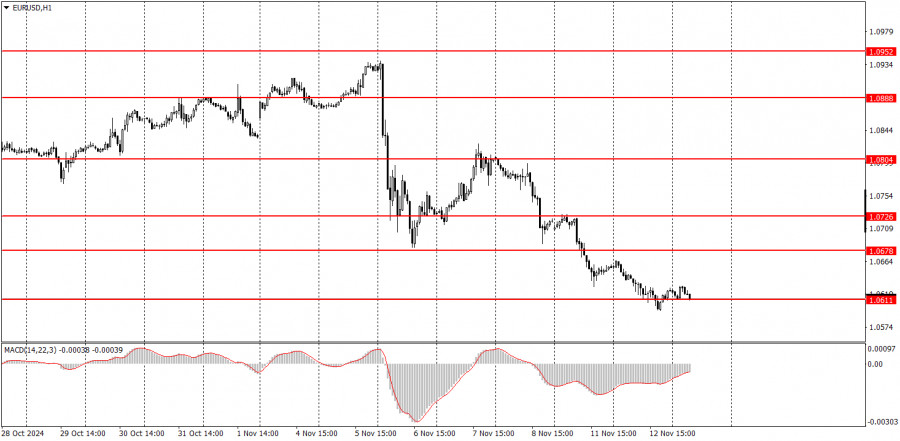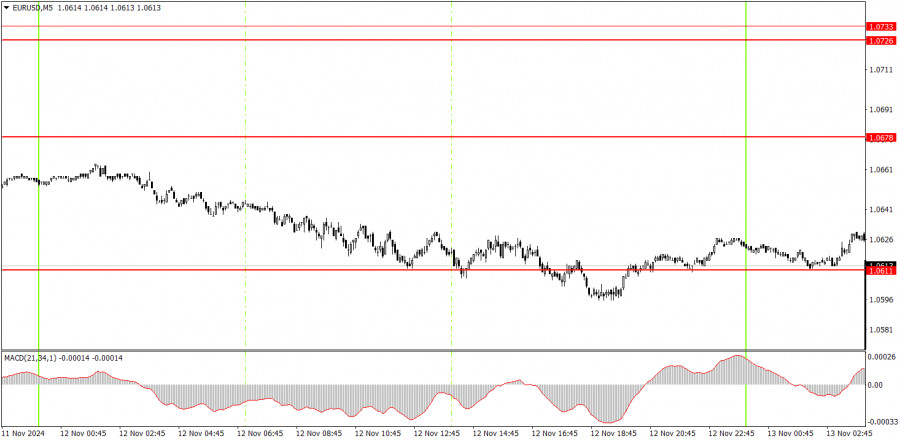Analysis of Tuesday's Trades:
1H Chart of EUR/USD Pair
On Tuesday, the EUR/USD currency pair continued its downward trajectory. Despite the lack of significant reports or events in the U.S. or the EU during the day, the market kept shedding the euro. This development comes as no surprise to us. We have long pointed out that the euro was overbought and unjustifiably expensive. The market previously priced in the Federal Reserve's monetary policy easing and is now adjusting the pair's exchange rate to a fair value.
Yesterday, the ZEW Economic Sentiment indices for the EU and Germany were released, both falling short of forecasts. However, it's unlikely that these indices were the primary driver of the euro's decline. The euro has been falling for a month and a half, often quite sharply. Previously, even amidst negative news from the EU, the euro continued to rise. Not even the latest Nonfarm Payrolls report from the U.S., which was a clear miss, has hindered the dollar's strength.
5M Chart of EUR/USD Pair
On Tuesday, several trading signals were formed around the 1.0611 level in the 5-minute time frame. However, the bigger picture includes Monday's developments. On Monday, a sell signal was formed around the 1.0678 level, after which the price dropped to 1.0611. Buying at the 1.0611 level made little sense, given the consistently strong downtrend observed daily.
How to Trade on Wednesday:
In the hourly time frame, the EUR/USD pair might start a correction again, but the market currently shows no inclination to buy the euro or take profits from short positions. We believe any upcoming correction (if it happens soon) will likely be shallow and require supportive news for the euro. However, even such news may not always help, as the market is now firmly oriented toward buying the dollar.
On Wednesday, we anticipate the decline to continue if the price consolidates below the 1.0611 level. We do not recommend buying the pair, even if an upward correction begins.
Key Levels for the 5-Minute Chart: 1.0568, 1.0611, 1.0678, 1.0726�1.0733, 1.0797�1.0804, 1.0845�1.0851, 1.0888�1.0896, 1.0940�1.0951, 1.1011. For Wednesday, no significant events are scheduled in the EU. However, the U.S. will release a critical inflation report for October, which will influence the Federal Reserve's interest rate decision in December. A substantial rise in inflation could trigger another surge in the U.S. dollar.
Basic Trading System Rules:
- The strength of a signal is determined by the time it takes to form (whether a bounce or breakthrough of a level). The quicker the formation, the stronger the signal.
- If two or more trades have been made near a level due to false signals, any further signals from that level should be ignored.
- In a flat market, a pair can generate many false signals or none at all. In any case, it's best to stop trading at the first signs of a flat market.
- Trading occurs between the start of the European and middle of the US sessions, after which all trades should be manually closed.
- On the hourly time frame, it's recommended to trade MACD indicator signals only when there is good volatility and a trendline or trend channel confirms a trend.
- If two levels are too close together (5 to 20 pips apart), they should be treated as support or resistance areas.
- After the price moves 15 pips in the intended direction, set the Stop Loss to breakeven.
What's on the Charts:
Support and Resistance Levels: Levels that serve as targets for opening buys or sells. Take Profit levels can be placed around these areas.
Red Lines: Channels or trend lines that indicate the current trend and the preferred trading direction.
MACD Indicator (14,22,3): Histogram and signal line�an auxiliary indicator that can also be used as a source of signals.
Major speeches and reports (always found in the news calendar) can significantly impact currency pair movements. Therefore, it's advised to trade cautiously or exit the market during their release to avoid sharp price reversals against prior movements.
Beginners trading on the forex market should remember that not every trade will be profitable. A clear strategy and money management are the keys to success in long-term trading.












